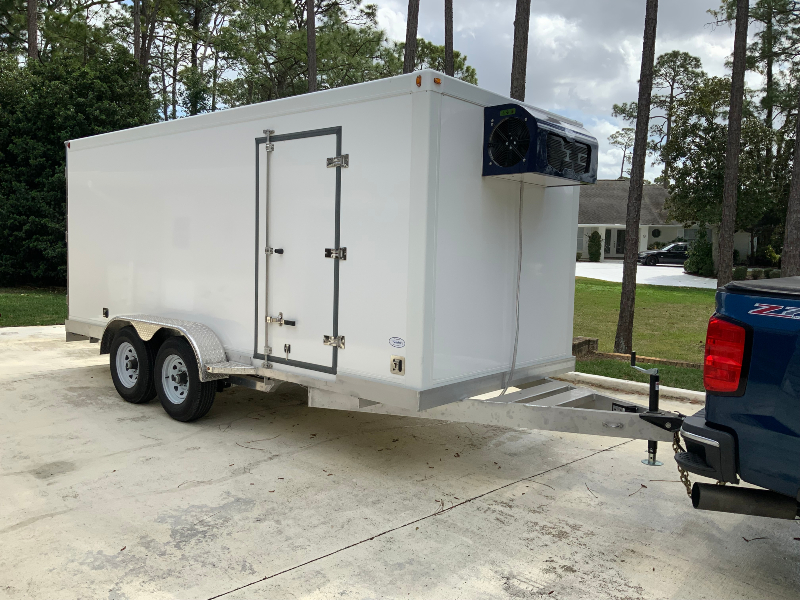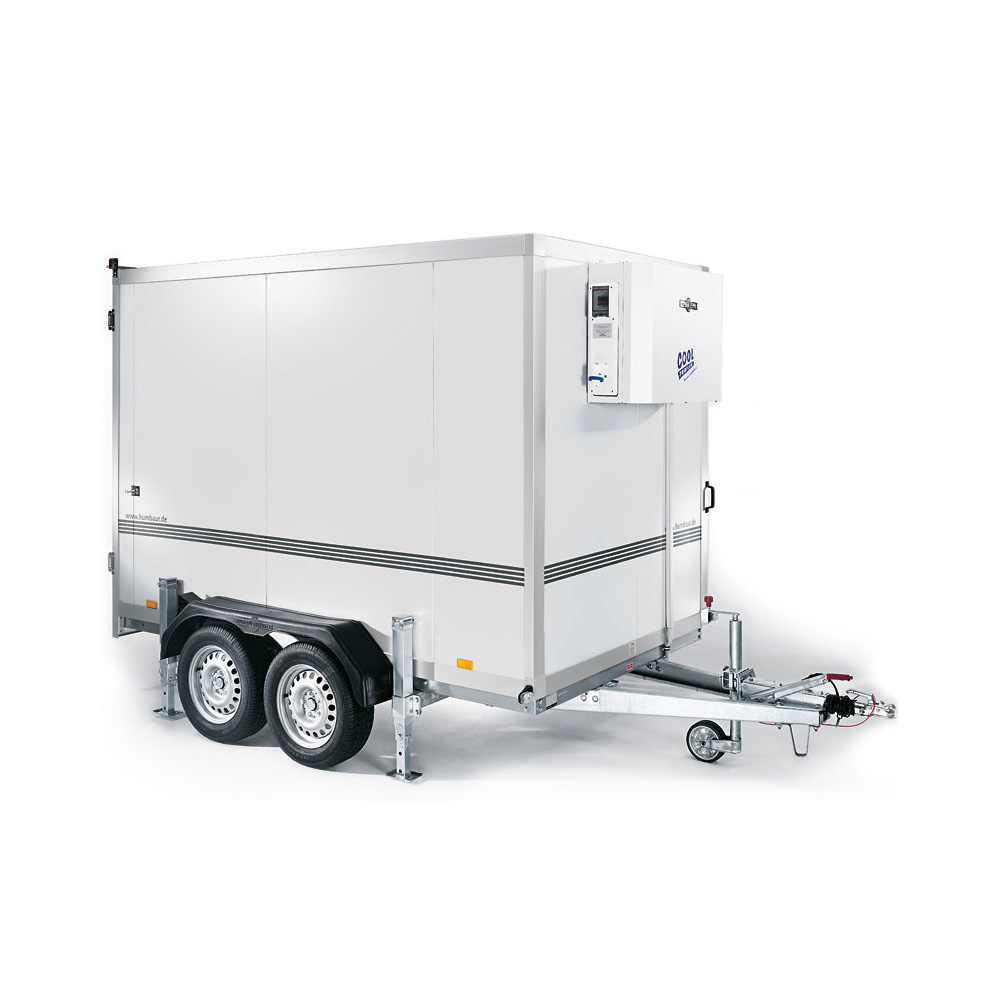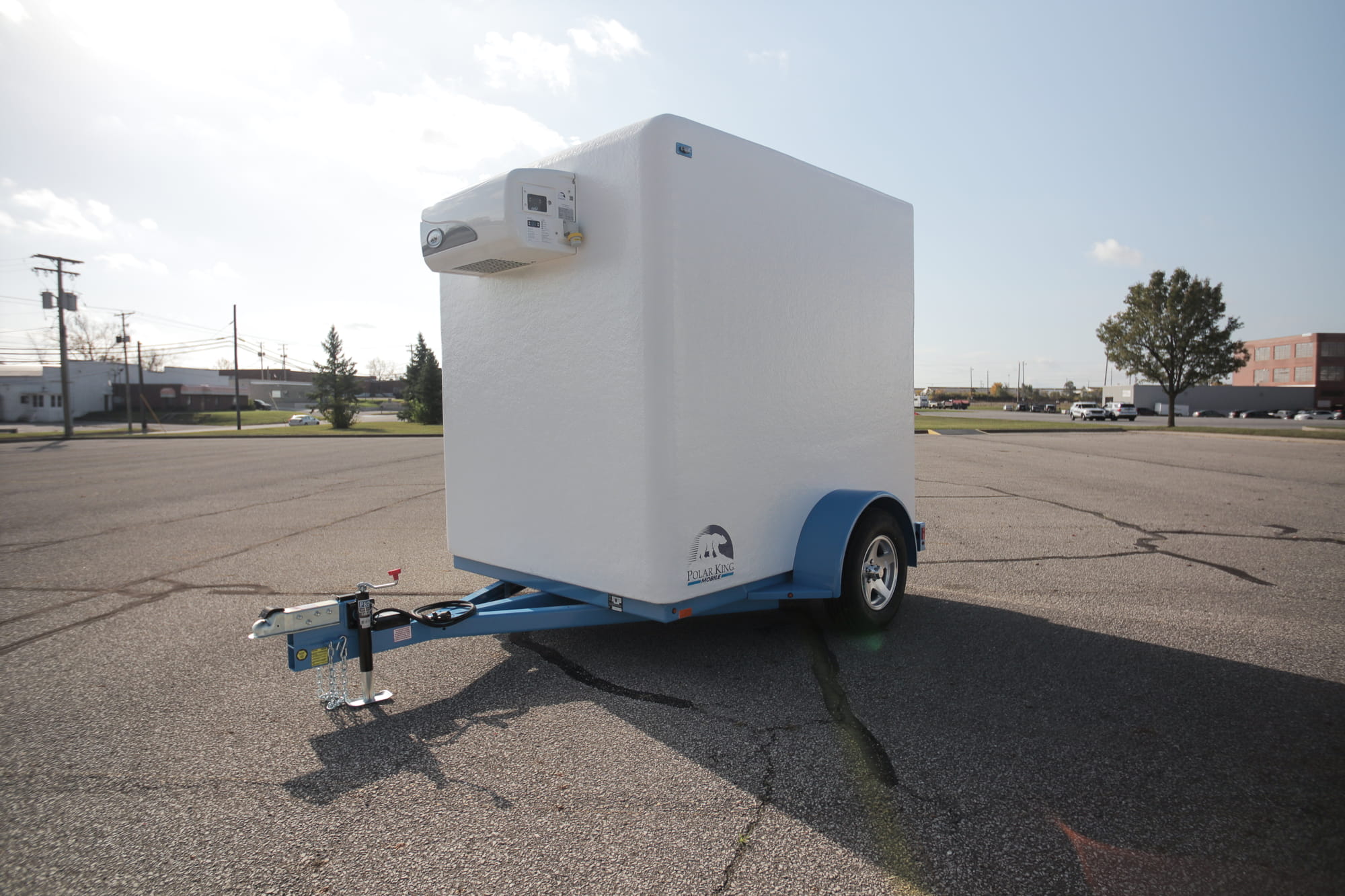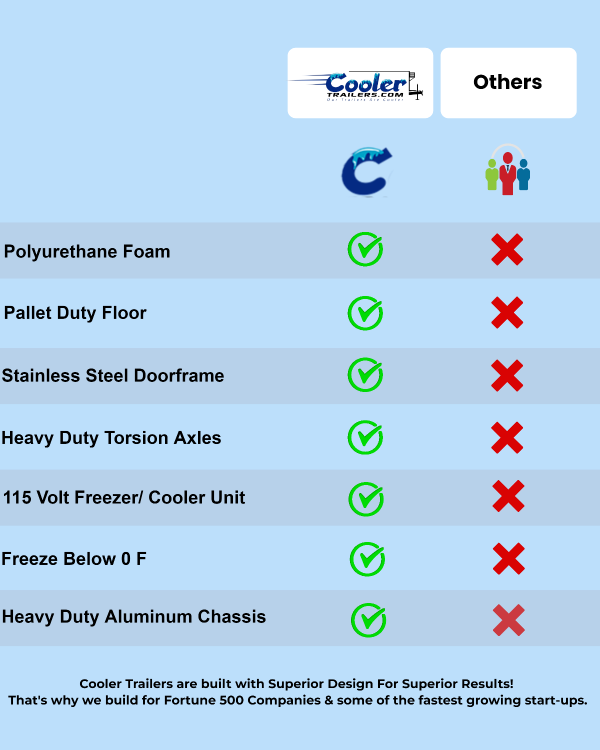Whatever You Need to Learn About Refrigerated Trailers for Transport Success
On the planet of transportation and logistics, the duty of chilled trailers is vital in guaranteeing the safe and reliable distribution of temperature-sensitive goods. These specialized trailers supply a controlled environment that is crucial for various sectors, ranging from food and drugs to floral and chemical products. Recognizing the complexities of chilled trailers, from their different sorts of refrigeration systems to the essential upkeep practices that can lengthen their lifespan and effectiveness, is essential for organizations looking for transportation success - small refrigerated trailer for sale. As we discover the nuances of these mobile freezer units and their market applications, a much deeper gratitude for their crucial contribution to the supply chain arises.
Value of Refrigerated Trailers

Preserving certain temperature varieties is important to avoid putridity, bacterial growth, and degradation of items, which can bring about substantial monetary losses for suppliers, providers, and sellers. By making use of cooled trailers, businesses can expand the service life of their products and promote rigid quality criteria, eventually enhancing client complete satisfaction and loyalty.
Moreover, refrigerated trailers make it possible for business to expand their market reach by helping with the transport of disposable items over lengthy ranges. This ability opens chances for businesses to supply their items to remote locations without endangering on freshness or safety and security. Essentially, cooled trailers are vital assets in the transport sector, working as the foundation of the cold chain logistics system.
Sorts Of Refrigeration Systems

Vapor-compression refrigeration systems function by pressing refrigerant gas to elevate its temperature and pressure, then cooling it to eliminate warm and reduced its temperature level prior to expanding it to evaporate and take in warm from the chilled space. This process is repeated to maintain the desired temperature inside the trailer.
On the other hand, absorption refrigeration systems utilize a warm resource to drive the refrigeration cycle. These systems are usually made use of in situations where electrical power is limited or unavailable. They utilize a combination of refrigerant and absorbent fluid to develop a continual cycle of dissipation and absorption, properly cooling down the inside of the trailer.
Picking the appropriate kind of refrigeration system for a cooled trailer depends upon elements such as the required temperature array, power effectiveness, and accessibility of source of power. Each system has its constraints and benefits, so it is important to choose the most ideal alternative based on specific transportation requirements.
Benefits of Using Refrigerated Trailers
Enhancing supply chain efficiency, refrigerated trailers play a crucial role in protecting the top quality of perishable products throughout transportation. The benefits of making use of refrigerated trailers are important and complex for industries depending on the secure distribution of temperature-sensitive products.
Secondly, cooled trailers supply precise temperature control, making sure that items continue to be undamaged and fresh throughout the journey. This degree of control is essential for preserving the high quality, preference, and safety and security of things such as fruits, veggies, dairy products, and pharmaceuticals (small refrigerated trailer for sale). By maintaining the needed temperature level range constantly, refrigerated trailers aid decrease putridity and waste, saving services substantial expenses in the lengthy run
Furthermore, utilizing cooled trailers improves consumer complete satisfaction by delivering products in optimal condition, therefore developing count on and loyalty. The integrity and effectiveness of cooled trailers add to a smooth next supply chain procedure, reducing interruptions and ensuring prompt distributions. Overall, the advantages of making use of chilled trailers contribute in attaining transportation success for firms handling perishable products.
Maintenance Tips for Refrigerated Trailers
To make sure the continued efficiency and reliability of chilled trailers in the transportation of perishable products, executing correct upkeep techniques is critical. Consistently evaluating the trailer's refrigeration device is important to recognize any potential issues prior to they escalate. This consists of inspecting the compressor, evaporator coils, and condenser for any signs of wear or damages. Additionally, preserving the correct temperature level setups based on the details demands of the freight being transported is critical. Surveillance and adjusting temperature controls on a regular basis can aid avoid temperature level changes that can compromise the top quality of the products. Keeping the trailer tidy both internally you could try here and externally is also vital for ideal performance. Clearing debris from the vents, making certain correct air flow, and examining the insulation for any spaces or leaks are all part of great maintenance practices. Scheduling routine maintenance with licensed technicians can help resolve any kind of hidden problems and maintain the cooled trailer operating efficiently throughout transport procedures.
Industry Applications of Refrigerated Trailers
The utilization of cooled trailers plays a crucial function in keeping the stability of temperature-sensitive items during transportation throughout various industries. In the food field, cooled trailers are extensively made use of to transfer perishable items such as fruits, veggies, milk items, and meats. This ensures that these goods continue to be risk-free and fresh for usage from the point of beginning to the final location. Drug companies additionally heavily count on chilled trailers to deliver temperature-sensitive medicines and vaccines, where preserving certain temperature arrays is essential to protecting the effectiveness of these items.


In addition, the floral industry benefits considerably from refrigerated trailers to deliver blossoms and plants over cross countries without jeopardizing their top quality. The use of refrigerated trailers reaches the health care field too, where medical supplies like organs for transplant or blood samples necessitate regulated temperature levels throughout transit. In general, the flexibility of cooled trailers makes them crucial throughout a wide variety of industries where temperature control is vital for product quality and safety.
Conclusion
Finally, refrigerated trailers play an important function in the transportation of disposable products, ensuring their freshness and quality throughout transportation. Recognizing the various kinds of refrigeration systems and carrying out appropriate maintenance practices are important for successful my sources procedures. The advantages of utilizing refrigerated trailers reach various sectors, from food and drink to pharmaceuticals. By utilizing these trailers effectively, organizations can fulfill the demands of their customers and keep the honesty of their products throughout the supply chain.
In the world of transportation and logistics, the function of chilled trailers is paramount in guaranteeing the risk-free and reliable shipment of temperature-sensitive products.In addition, chilled trailers enable companies to expand their market reach by promoting the transport of perishable products over lengthy ranges. On the whole, the advantages of using refrigerated trailers are important in accomplishing transportation success for business dealing with disposable products.
To make sure the ongoing performance and dependability of refrigerated trailers in the transportation of perishable goods, executing appropriate maintenance methods is essential.The usage of refrigerated trailers plays a critical role in maintaining the integrity of temperature-sensitive goods throughout transport throughout different industries.
Comments on “Portable and Reliable: Small Refrigerated Trailer for Sale to Meet Your Air Conditioning Demands”